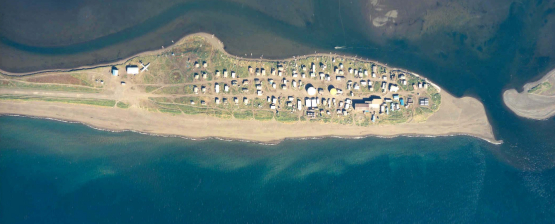Litigation has long played a powerful role in shaping policies on a variety of environmental issues.
Add global warming to the list. Recent rulings in a pair of federal lawsuits with strong Texas connections illustrate how judges are starting to grapple with allegations of harm resulting from manmade climate change.
One of the lawsuits was brought by Mississippi landowners. The other was brought by residents of an Alaskan subsistence fishing village. Defendants in both cases include major Texas-based energy companies, and a lead attorney in the Alaska case is a partner in a prominent Houston law firm.

Village of Kivalina, Alaska
Both the Mississippi and Alaska suits involve claims related to sea-level rise attributed to global warming. Both are based in part on the U.S. Supreme Court’s 2007 ruling in a lawsuit by Massachusetts and other states that greenhouse gases qualify for regulation under the federal Clean Air Act – something the Obama administration is now moving to do. (The environmental group Public Citizen is also using arguments like those employed in the Massachusetts case in a lawsuit seeking to force Texas officials to regulate greenhouse emissions.)
In the Mississippi case, a panel of the U.S. 5th Circuit Court of Appeals ruled last week that plaintiffs could pursue their legal claim, filed just three weeks after Hurricane Katrina, that greenhouse emissions by defendants had increased the storm’s destructiveness by boosting sea-level rise.
Companies named as defendants in the case [PDF] include Texas-based Shell Oil, ExxonMobil, Kerr-McGee, Total PetroChemicals, Pioneer Natural Resources, Total Gas & Power, Anadarko Petroleum and Apache.
Mark Schleifstein reported in the New Orleans Times-Picayune:
Gerald Maples, lead attorney for the landowners in the class-action lawsuit, said he filed the suit 22 days after Katrina to get the attention of energy officials about greenhouse gas emissions.
“My primary goal was to say you are at risk within the legal system and you should be cooperating with Congress, the White House and the Kyoto Protocol,” an international treaty designed to reduce emissions of carbon dioxide and other greenhouse gases.
The ruling is the second time in recent weeks an appeals court has allowed a similar lawsuit to move forward.
In September, the U.S. 2nd Circuit Court of Appeals allowed Connecticut and other states to proceed with a suit aimed at forcing American Electric Power and other utilities to reduce greenhouse emissions.
In a contrary ruling, however, the U.S. District Court for the Northern District of California last week dismissed a lawsuit [PDF] by the village of Kivalina, a small settlement of about 420 residents, mainly Alaska Native, at the end of a six-mile-long a barrier reef in northwestern Alaska.
It alleged that the village will have to relocate because greenhouse emissions by ExxonMobill and 23 other defendant companies had contributed to a decline in sea ice that protects the community against waves and storm surge. Other defendants in the case include Texas-based ConocoPhillips, Shell Oil, Dynegy and Reliant Energy.
The Houston Business Journal’s Ford Gunter reported:
Taking a page out of the tobacco litigation playbook, co-lead attorney Steve Susman of Houston’s Susman Godfrey LLP also tacked on conspiracy allegations, claiming that exploration and production, power and coal companies conspired to mislead the public about the causes and effects of global warming through industry-sponsored trade groups — viewed as “scientists for hire” in some circles — in much the same way as “Big Tobacco” did to mislead the public for decades on the effects of cigarette smoking.
Long able to squash lawsuits, the tobacco industry did not have a suitable answer for the conspiracy charges. Big Oil, though, might have, as the court decided that a planet-wide issue could not be laid at the feet of a select few companies.
Susman had represented, on a pro bono basis, a coalition of Texas cities including Houston and Dallas whose efforts were among various pressures that led to Dallas-based TXU’s abandonment of plans for eight new coal-fired power plants.
Susman Godfrey’s Web site offers a glimpse into the emphasis that some major law firms are assigning to the emerging legal specialty of climate change litigation.
Susman’s personal page on the site cites the TXU issue in stating that he “has recently become a pioneer in global warming litigation.” The page about the firm’s environmental practice is headlined “Climate Change” and states that “Susman Godfrey is at the forefront of this new field.”
An article by Jennifer Koons of the Greenwire news service, posted on the New York Times Web site, examined the recent rulings in the Connecticut, Mississippi and Alaska cases and their possible implications in detail.Koons reported that an appeal is expected in all three lawsuits and that “legislative action (on climate change) may be a welcomed intervention for both sides in each of the three cases.”
– Bill Dawson
